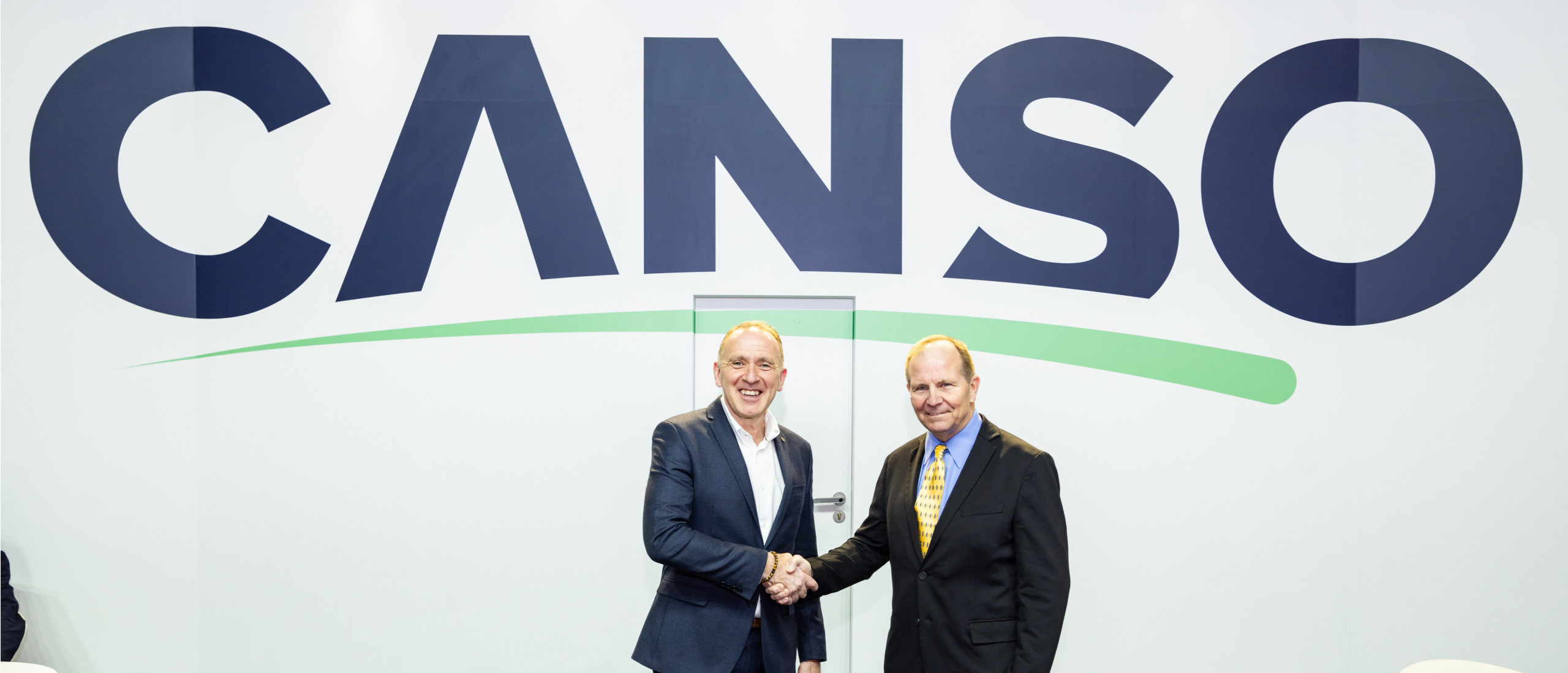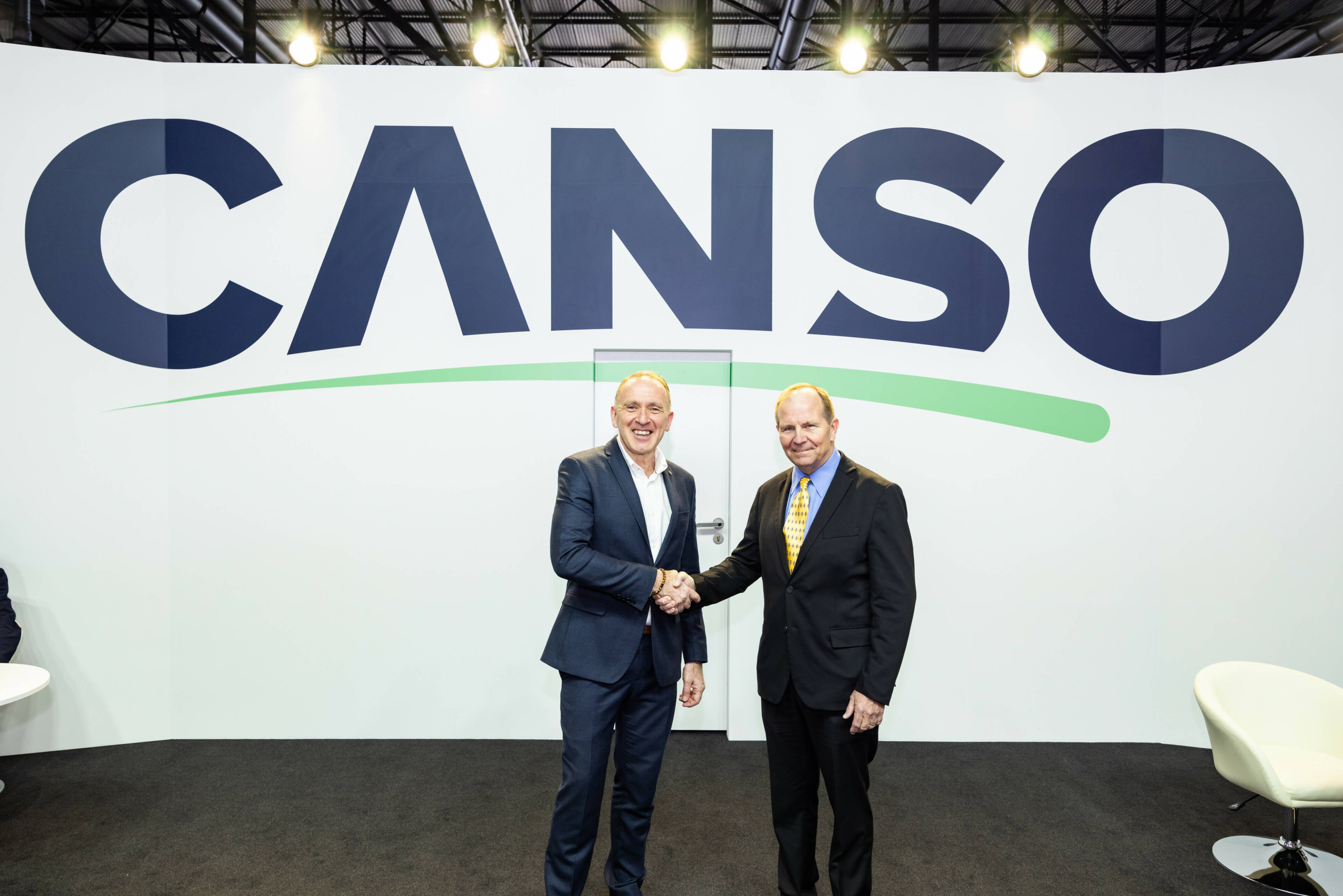



Photo: By Pierre Albouy at Airspace World 2024
In photo: Simon Hocquard, CANSO Director General and Clyde Rinkinen, Associate Professor - Embry Riddle Aeronautical University at Airspace World 2024.
Between the entire Embry-Riddle Aeronautical University faculty there are hundreds of years of experience in air navigation service providers (ANSP). Rinkinen hopes to leverage this global academic experience through participation in CANSO working groups, including safety, operations, and emerging technology.
“And we hope to leverage our CANSO membership to participate in Complete Air Traffic System (CATS), ICAO and other industry work groups,” says Rinkinen. “The aim is to be a recognised asset available to CANSO members to further research and advance the state air navigation service industry. In addition, we hope the academic membership attracts additional universities across the globe. The synergy of cross-campus research and input would be a tremendous asset to CANSO members.”
Besides creating and mentoring tomorrow’s aviation and aerospace workforce, Embry-Riddle Aeronautical University is involved in research across all facets of aviation. The unbiased scientific principles that this offers CANSO members should enable unique perspectives and research capabilities.
As Rinkinen and McCormick note, the university sent a CubeSat Camera System on a moon lander this year so the ability to think outside the box and come up with innovative solutions is well documented.
NASA joins
In addition to Embry-Riddle Aeronautical University, CANSO has announced that NASA has become an Associate member. This new partnership underscores CANSO’s commitment to fostering collaboration and innovation within the aviation industry.
With NASA’s renowned expertise and groundbreaking research in aerospace exploration and technology, their participation as an Associate member will enrich the collective knowledge and drive forward-thinking initiatives aimed at advancing air traffic management and airspace operations globally.
CANSO looks forward to the valuable contributions and insights that NASA will bring to the organisation’s collaborative efforts towards shaping the future of aviation.
Winning formula
Dr. Michael McCormick and Clyde Rinkinen. Associate Professors at Embry-Riddle Aeronautical University, say that: “CANSO’s creation of the academic membership category provided the vehicle,” that enabled Embry-Riddle to formally join CANSO.
“It was an easy and natural decision for Embry-Riddle to join CANSO,” they note. “When governments, industry, and academia work together we have a winning formula for developing the correct strategies to move aviation forward."
“We focus on relevant and topical interests, such as system safety, global harmonisation, air traffic control operations, air traffic flow management and new airspace entrants,” continues Rinkinen.
Dr. McCormick adds that the university is engaged in fund research on stress management, tower controller scanning patterns, advanced air mobility and the integration of uncrewed airborne systems in disaster relief and recovery.
Within the entire Embry-Riddle Aeronautical University faculty there are hundreds of years of experience in air navigation service. Rinkinen hopes to leverage this global academic experience through participation in CANSO working groups, including safety, operations, and emerging technology.
The category targets organisations that can help CANSO and its members shape the future skies and prepare for the next generation of air traffic management. It is focused on fostering education, research, and knowledge dissemination in the aviation field and is aimed at those who specialise in matters related to aviation and air traffic management.
Other membership benefits in this category include participation in CANSO groups, collaboration on research projects, potential involvement in postgraduate scholarship programmes, enhanced visibility within the ATM community, and opportunities to promote educational courses and study programmes.
“We are delighted to announce that Embry-Riddle Aeronautical University has submitted the first application to join the Academia and Research Membership category,” says Eduardo Garcia, CANSO Senior Manager Future Skies. “This milestone achievement signifies the beginning of an exciting journey towards fostering collaboration, innovation, and mutual growth.”
Embry-Riddle Aeronautical University is the first organisation to join CANSO’s new Academia and Research membership category.






In photo: Simon Hocquard, CANSO Director General and Clyde Rinkinen, Associate Professor - Embry Riddle Aeronautical University at Airspace World 2024.

Between the entire Embry-Riddle Aeronautical University faculty there are hundreds of years of experience in air navigation service providers (ANSP). Rinkinen hopes to leverage this global academic experience through participation in CANSO working groups, including safety, operations, and emerging technology.
“And we hope to leverage our CANSO membership to participate in Complete Air Traffic System (CATS), ICAO and other industry work groups,” says Rinkinen. “The aim is to be a recognised asset available to CANSO members to further research and advance the state air navigation service industry. In addition, we hope the academic membership attracts additional universities across the globe. The synergy of cross-campus research and input would be a tremendous asset to CANSO members.”
Besides creating and mentoring tomorrow’s aviation and aerospace workforce, Embry-Riddle Aeronautical University is involved in research across all facets of aviation. The unbiased scientific principles that this offers CANSO members should enable unique perspectives and research capabilities.
As Rinkinen and McCormick note, the university sent a CubeSat Camera System on a moon lander this year so the ability to think outside the box and come up with innovative solutions is well documented.
In addition to Embry-Riddle Aeronautical University, CANSO has announced that NASA has become an Associate member. This new partnership underscores CANSO’s commitment to fostering collaboration and innovation within the aviation industry.
With NASA’s renowned expertise and groundbreaking research in aerospace exploration and technology, their participation as an Associate member will enrich the collective knowledge and drive forward-thinking initiatives aimed at advancing air traffic management and airspace operations globally.
CANSO looks forward to the valuable contributions and insights that NASA will bring to the organisation’s collaborative efforts towards shaping the future of aviation.
NASA joins
Dr. Michael McCormick and Clyde Rinkinen. Associate Professors at Embry-Riddle Aeronautical University, say that: “CANSO’s creation of the academic membership category provided the vehicle,” that enabled Embry-Riddle to formally join CANSO.
“It was an easy and natural decision for Embry-Riddle to join CANSO,” they note. “When governments, industry, and academia work together we have a winning formula for developing the correct strategies to move aviation forward."
“We focus on relevant and topical interests, such as system safety, global harmonisation, air traffic control operations, air traffic flow management and new airspace entrants,” continues Rinkinen.
Dr. McCormick adds that the university is engaged in fund research on stress management, tower controller scanning patterns, advanced air mobility and the integration of uncrewed airborne systems in disaster relief and recovery.
Within the entire Embry-Riddle Aeronautical University faculty there are hundreds of years of experience in air navigation service. Rinkinen hopes to leverage this global academic experience through participation in CANSO working groups, including safety, operations, and emerging technology.
Winning formula
The category targets organisations that can help CANSO and its members shape the future skies and prepare for the next generation of air traffic management. It is focused on fostering education, research, and knowledge dissemination in the aviation field and is aimed at those who specialise in matters related to aviation and air traffic management.
Other membership benefits in this category include participation in CANSO groups, collaboration on research projects, potential involvement in postgraduate scholarship programmes, enhanced visibility within the ATM community, and opportunities to promote educational courses and study programmes.
“We are delighted to announce that Embry-Riddle Aeronautical University has submitted the first application to join the Academia and Research Membership category,” says Eduardo Garcia, CANSO Senior Manager Future Skies. “This milestone achievement signifies the beginning of an exciting journey towards fostering collaboration, innovation, and mutual growth.”
Embry-Riddle Aeronautical University is the first organisation to join CANSO’s new Academia and Research membership category.




